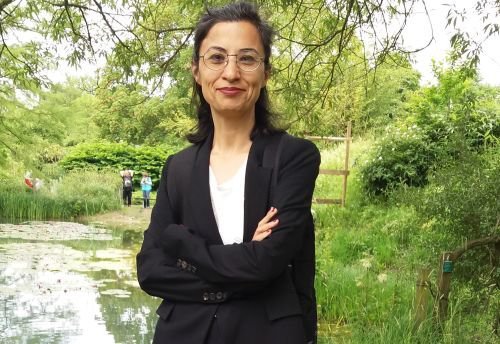A recurring theme in research findings based on my interviews with second- and third-generation Turkish immigrants in the Netherlands is that of migrants feeling themselves estranged from Dutch as well as Turkish society*.
In the words of 55 year old shop owner Cemal, a second generation Turkish immigrant: "Wherever you go, you are a foreigner, both here and in Turkey. You do not have any local connection. How can you have anything local? You are a foreigner both here (the Netherlands) and there (Turkey).
Eda, a 25-year-old third generation female Turkish immigrant, born in the Netherlands and working in her father's butcher's shop, agrees:
When you go to Turkey you are a foreigner in one way, and here you are a foreigner in a different way. It is like being a thing in between.
Now, the problem with being 'a thing in between' seems to be related to a loss of capacity for agency. Hybridity, at least sometimes, can make it more difficult for persons to realize their goals of action, as it makes them less confident about how to relate to other people. Eda, for instance, describes how her unfamiliarity with the Turkish language makes her appear like a foreigner when visiting Turkey:
Even when you go to Turkey ... you are being seen as a foreigner ... First of all, you cannot speak the Turkish language as people in Turkey do. What is proper Turkish, where and how does one speak it? We do not know this. For example, the reason why I speak as much Turkish as I actually do is that I took a Turkish language class at school for an hour every week ... But when I go to Turkey, where I have got nieces, the way they speak is very different from the way we speak. They are more polite compared to us.
For instance, there is a difference between the more formal (and hence more 'polite') "geliyorum" (meaning 'I am coming') and the more vernacular (and hence less 'polite') "geliyom." Not to be aware of this distinction carries with it the risk of being characterized as 'foreign' in a Turkish context:
I have a little bit of difficulty when speaking Turkish ... It is also about being polite ... At home and among friends, I can say geliyom. Among others we have this obligation to be polite ... When talking to a friend, I do not think I ever speak in this polite manner, saying things like 'in case you are available, may I come and see you?' ... But in Turkey, it is polite to speak like this.
Hence, from the point of view of language, Eda experiences hybridity not only as being in between Turkish and Dutch cultures. She is also 'in between' in relation to urban and rural Turkish culture itself.
Likewise, Mehmet describes how his way of speaking Turkish makes him appear as a foreigner in Turkey, and how this has consequences for the way in which he is being treated there. He finds himself overcharged and exploited like a tourist:
"In Turkey, they try to sell you products at a higher price. They take more money from Turks coming from here. They treat you like a tourist. Tourists are being oppressed."
Mehmet finds his capacity for agency reduced, as it becomes more difficult for him to be successful in business and on the market in general, being perceived as a foreigner. His pessimistic conclusion concerning his Turkish-Dutch hybridity is that we do not get anything from either of these two languages and cultures – we cannot really come to an understanding with them.
However, not every informant was equally negative about being in between cultures. Mert, a student at a law school and born in the Netherlands, while describing Turkish immigrants as victims of prejudice ('They think that we dress in fez and our women in black religious clothes'), also claimed that being foreign could be something good:
Being a foreigner is a nice thing. I am happy (to be a foreigner). I like being a foreigner ... I don't see it as an obstacle in my social life. I am Dutch and Turkish ... So you are a foreigner to both (cultures) and you are within both (cultures). It depends on how you look at things.
Likewise, Fikret, a 27-year-old male, born in an immigrant Turkish family and a university graduate in the field of business communication and information technology, also views his position as one in which he has access to two cultures rather than as one in which he is deprived of both of them. Saying that he feels sixty percent Turkish and forty percent Dutch, he gives the impression that he enjoys this mixed identity:
You know the negative and positive ways of both cultures. So you can take what you like from both of them and add to your daily life.
* This text was previously published in Migration Letters in 2016 as part of an article I co-authored with Prof. Dr. Per Bauhn, titled "Hybridity and agency: some theoretical and empirical observations."
(PE)





